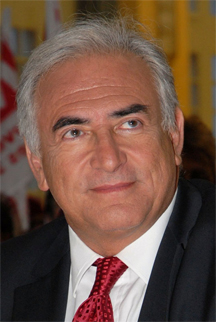Dominique Strauss-Kahn is Managing Director of the International Monetary Fund.
 By Dominique Strauss-Kahn
By Dominique Strauss-Kahn
WASHINGTON, DC – Roughly one year ago, the global economic situation looked grim: a severe global recession, sizeable wealth destruction, and declines in trade and employment. But a disaster of “Great Depression” proportions was averted, thanks to unprecedented economic-policy coordination by governments around the world. Continued cooperation, one hopes, will be the legacy of this crisis.
The global economy is now on a recovery path, albeit uneven, and financial conditions have improved substantially. Clouds of uncertainty linger, however, and there is much unfinished business.
Indeed, the work needed to build a more robust, stable, and safe global financial system has only just begun. Moreover, the recovery is not global, unemployment is still rising in most countries, global savings imbalances have not been addressed, and conditions in the worlds’ poorest states remain vulnerable. These issues have broad implications for global stability and peace. Remember, economic stability lays the groundwork for peace, while peace is a necessary precondition for trade and sustained economic growth.
In the annals of economic crises then, where do we find ourselves? In policy terms, we are at a critical point where fundamental changes to the system can be made, in part because our collective memory is sufficiently fresh to supply the necessary political will. We must not waste this opportunity.
What needs to be done? Global economic governance, including at the IMF, must be reformed to reflect the realities of the current era, and global financial-sector supervision and regulation need to be strengthened. Progress is well underway in both areas, but we must maintain the momentum into 2010 and beyond.
This year, leaders have moved decisively to make the G-20 the main forum for international economic cooperation; tripled the IMF’s resources; agreed to shift some of the Fund’s quota share to under-represented emerging and developing countries; and committed to submitting their economic policy frameworks to “mutual assessment,” with the IMF’s help. Recognizing that countries can no longer expect to achieve their economic goals in isolation, this peer review aims to incorporate systematically the goal of collective global welfare into national policy planning.
More specifically, what are the governance priorities for policymakers in 2010? This past autumn, IMF members endorsed the G-20’s proposals, and asked the Fund to address four key reform areas – the so called “Istanbul Decisions” – in 2010: the IMF’s mandate, the Fund’s financing role, governance, and multilateral surveillance.
First, we will re-assess the Fund’s original mandate – as set out in the IMF’s Articles, and as practiced in recent years – in light of the range of economic and financial-sector policies that currently affect global stability. While the broad goals of promoting global financial stability and sustainable growth remain relevant, the surge in international capital flows, financial sector linkages, cross-border asset holdings, and the nature of this crisis all underscore the need to review the mandate and how we execute it.
Second, following from the mandate question, we need to work closely with members to determine the optimal financing role of the IMF. Many countries have built up large official foreign-exchange reserves, in part as greater self-insurance against adverse external developments. Self-insurance, however, complicates domestic monetary and exchange-rate management, represents a misallocation of capital domestically and globally, and raises the risk of bigger financial crises down the road.
As part of an overhaul of the Fund’s lending facilities, we introduced the Flexible Credit Line (FCL), a pre-emptive insurance facility for members with strong policies. While three countries (Mexico, Poland, and Colombia) have used this facility, innovation on a greater scale is probably needed.
Third, in Istanbul, the IMF’s governing body endorsed the big step forward on governance agreed by the G-20: a shift in quota shares of at least 5% (by January 2011) from over-represented countries toward dynamic but under-represented emerging markets and developing countries. This change will mark a much-needed step toward making the Fund more democratic, giving members a more credible stake in its management, strategic operations, and aspirations. Greater legitimacy, in turn, will make the IMF more effective in promoting economic growth and stability in all of our member states. Members must push ahead to ratify the 2008 quota increase, and to move forward the 2010 quota review.
Fourth, the IMF’s governing body endorsed the G-20 proposal for the Fund to help with their peer review. The IMF has considerable experience with cooperative, peer reviews of members’ policy frameworks. But its advice has not always brought about concrete policy action by members. With the quota change noted above and the new G-20 “mutual assessment,” the traction of surveillance should become significantly deeper. Policymakers need to follow through on their commitment to the peer review process.
Finally, in the area of financial-sector supervision and regulation, governments should forge ahead on reform of micro-prudential (individual entities) and macro-prudential (globally and nationally systemic) regulation. The IMF is working with the Financial Stability Board and other organizations to develop new principles and guidelines, including on capital, liquidity, leverage, interconnectedness, systemically important institutions, the “perimeter” of regulation, and the pro-cyclical nature of rules. The challenge in this field will be to guard against complacency, while not overburdening the system with excessive regulation.
Policymakers have a big agenda ahead, but they have already made an impressive start. As long as they continue working together to address common challenges in a cooperative spirit, the prospects for success look good.







